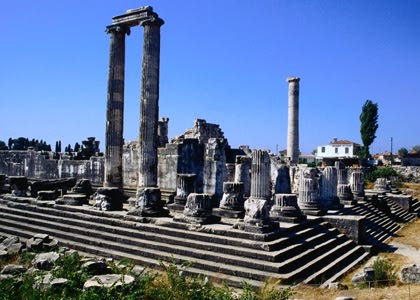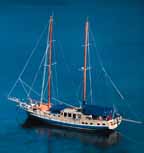
Turkey's first known human inhabitants
hung out in the Mediterranean region
as early as 7500 BC, and the cycles of empire building, flexing, flailing
and
crumbling didn't take long to kick in. The first great civilisation was
that of the
Hittites, who worshipped a sun goddess and a storm god. The Hittites
dominated Anatolia from the Middle Bronze Age (1900-1600 BC), clashing
with Egypt under the great Ramses II and capturing Syria, but by the time
Achaean Greeks attacked Troy in 1250 BC, the Hittite machine was
creaking. A massive invasion of 'sea peoples' from Greek islands and
city-states put untenable pressure on the Hittites and a jumble of smaller
kingdoms (amongst them Phrygians, Urartians and Lydians) played at border
bending until Cyrus, emperor of Persia (550-530 BC) swept into Anatolia
from the east. The Persians were booted out by Alexander the Great, who
conquered the entire Middle East from Greece to India around 330 BC. After
Alexander died his generals squabbled over the spoils and civil war was
the norm until the Galatians (Celts) established a capital at Ankara in
279 BC,
bedding down more or less comfortably with the Seleucid, Pontic,
Pergamum and Armenian kingdoms.


An Ottoman general, Mustafa Kemal, had begun organising resistance, sure
that a new government must seize the fate of Turkey for the Turkish people.
When Greece invaded Smyrna and began pushing east, the Turks were
first shocked and then galvanised into action. The War of Independence
lasted from 1920 to 1922, ending in a bitterly won Turkish victory and
the
abolition of the sultanate. Mustafa Kemal (Atatrk or Father Turk) undertook
the job of completely remaking Turkish society. By the time he died in
1938, a
constitution had been adopted, polygamy abolished and the fez, mark of
Ottoman backwardness, was prohibited. Islam was removed as the state
religion, Constantinople became Istanbul and women obtained the right to
vote and to serve in parliament. Atatrk remains a true hero in Turkey:
his
statue is everywhere and there are laws against defaming or insulting him.
Atatrk's successor, Ismet Inn managed a precarious neutrality in WWII,
then
oversaw Turkey through the transition to a true democracy. The opposition
Democratic Party won the election in 1950. In 1960, and again in 1970,
an
overreaching Democratic Party was brought back into line by watchful army
officers, who deemed the government's autocratic ways a violation of the
constitution. In 1980 political infighting and civil unrest brought the
country to
a halt. Left and right fringe groups caused havoc, supported on the one
hand by the Soviet bloc and on the other by fanatical Muslim groups. In
the
centre, the two major political parties were deadlocked so badly that for
months they couldn't elect a parliamentary president. The military stepped
in
again, to general relief, but at the price of strict control and some human
rights abuses.
The head of the military government, General Kenan Evren, resigned his
military commission and became Turkey's new president. Free elections in
1983 saw Turgut zal's centre-right party take power and oversee a
business boom which lasted through the 1980s. Ozal's untimely death in
1993
removed a powerful, innovative force from Turkish politics and set the
scene for uncertainty to seep back in: the rest of the decade has seen
unstable coalitions formed between unlikely bedfellows and resurgent
support for the religious right. In early 1998, Turkey's Constitutional
Court
banned the Islamic-oriented Welfare Party, and along with it, previous
PM
Necmettin Erbakan. The Welfare Party was found to be working to
undermine Turkey's secular democratic basis. After 1999 elections DSP
became major party and its president Bulent Ecevit became P.M.

home